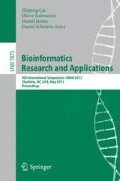Abstract
Assigning an optimal combination of empirical amino acid substitution models (e.g., WAG, LG, MTART) to partitioned multi-gene datasets when branch lengths across partitions are linked, is suspected to be an NP-hard problem. Given p partitions and the approximately 20 empirical protein models that are available, one needs to compute the log likelihood score of 20p possible model-to-partition assignments for obtaining the optimal assignment.
Initially, we show that protein model assignment (PMA) matters for empirical datasets in the sense that different (optimal versus suboptimal) PMAs can yield distinct final tree topologies when tree searches are conducted using RAxML.
In addition, we introduce and test several heuristics for finding near-optimal PMAs and present generally applicable techniques for reducing the execution times of these heuristics. We show that our heuristics can find PMAs with better log likelihood scores on a fixed, reasonable tree topology than the naïve approach to the PMA, which ignores the fact that branch lengths are linked across partitions. By re-analyzing a large empirical dataset, we show that phylogenies inferred under a PMA calculated by our heuristics have a different topology than trees inferred under a naïvely calculated PMA; these differences also induce distinct biological conclusions. The heuristics have been implemented and are available in a proof-of-concept version of RAxML.
Access this chapter
Tax calculation will be finalised at checkout
Purchases are for personal use only
Preview
Unable to display preview. Download preview PDF.
References
Tavaré, S.: Some probabilistic and statistical problems in the analysis of DNA sequences. Some Mathematical Questions in Biology-DNA Sequence Analysis 17, 57–86 (1986)
Abascal, F., Posada, D., Zardoya, R.: Mtart: a new model of amino acid replacement for arthropoda. Mol. Biol. Evol. 24(1), 1–5 (2007)
Whelan, S., Goldman, N.: A general empirical model of protein evolution derived from multiple protein families using a maximum-likelihood approach. Mol. Biol. Evol. 18(5), 691–699 (2001)
Le, S., Gascuel, O.: An improved general amino acid replacement matrix. Mol. Biol. Evol. 25(7), 1307–1320 (2008)
Sullivan, J., Swofford, D.: Are guinea pigs rodents? The importance of adequate models in molecular phylogenetics. J. Mamm. Evol. 4(2), 77–86 (1997)
Keane, T., Creevey, C., Pentony, M., Naughton, T., Mclnerney, J.: Assessment of methods for amino acid matrix selection and their use on empirical data shows that ad hoc assumptions for choice of matrix are not justified. BMC Evol. Biol. 6(1), 29 (2006)
Lanfear, R., Calcott, B., Ho, S., Guindon, S.: Partitionfinder: combined selection of partitioning schemes and substitution models for phylogenetic analyses. Mol. Biol. Evol. 29(6), 1695–1701 (2012)
Meusemann, K., von Reumont, B., Simon, S., Roeding, F., Strauss, S., Kück, P., Ebersberger, I., Walzl, M., Pass, G., Breuers, S., et al.: A phylogenomic approach to resolve the arthropod tree of life. Mol. Biology Evol. 27(11), 2451–2464 (2010)
Yutin, N., Puigbò, P., Koonin, E., Wolf, Y.: Phylogenomics of Prokaryotic Ribosomal Proteins. PloS ONE 7(5) (2012)
Stamatakis, A., Ludwig, T., Meier, H.: RAxML-III: A Fast Program for Maximum Likelihood-based Inference of Large Phylogenetic Trees. Bioinformatics 21(4), 456–463 (2005)
Kobert, K., Hauser, J., Stamatakis, A.: Is the Protein Model Assignment Problem NP-hard?; Exelixis-RRDR-2012-9; Technical report, Heidelberg Institute for Theoretical Studies (October 2012), http://sco.h-its.org/exelixis/pubs/Exelixis-RRDR-2012-9.pdf
Posada, D.: In: Selection of Phylogenetic Models of Molecular Evolution. John Wiley & Sons, Ltd. (2001)
Abascal, F., Zardoya, R., Posada, D.: Prottest: selection of best-fit models of protein evolution. Bioinformatics 21(9), 2104–2105 (2005)
Tanabe, A.: Kakusan4 and aminosan: two programs for comparing nonpartitioned, proportional and separate models for combined molecular phylogenetic analyses of multilocus sequence data. Mol. Ecol. Resources 11(5), 914–921 (2011)
Yang, Z.: Among-site rate variation and its impact on phylogenetic analyses. Trends Ecol. & Evol. 11(9), 367–372 (1996)
Yang, Z.: Maximum likelihood phylogenetic estimation from DNA sequences with variable rates over sites. J. Mol. Evol. 39, 306–314 (1994)
Hauser, J.: Algorithms for Model Assignment in Multi-Gene Phylogenetics. Master’s thesis, Ruprecht-Karls University Heidelberg (2012)
Kirkpatrick, S., Gelatt, C., Vecchi, M.: Optimization by simulated annealing. Science 220(4598), 671 (1983)
Aarts, E., Laarhoven, P.: Simulated annealing: an introduction. Stat. Neerland. 43(1), 31–52 (1989)
Stamatakis, A.: RAxML-VI-HPC: maximum likelihood-based phylogenetic analyses with thousands of taxa and mixed models. Bioinformatics 22(21), 2688–2690 (2006)
Robinson, D., Foulds, L.: Comparison of phylogenetic trees. Math. Biosci. 53(1-2), 131–147 (1981)
Yutin, N., Puigbò, P., Koonin, E., Wolf, Y.: Phylogenomics of Prokaryotic Ribosomal Proteins. PloS ONE 7(5), e36972 (2012)
Fletcher, W., Yang, Z.: Indelible: a flexible simulator of biological sequence evolution. Mol. Biol. Evol. 26(8), 1879–1888 (2009)
Grimaldi, D.: 400 million years on six legs: On the origin and early evolution of Hexapoda. Arthropod Struct. & Dev. 39(2), 191–203 (2010)
Trautwein, M., Wiegmann, B., Beutel, R., Kjer, K., Yeates, D.: Advances in insect phylogeny at the dawn of the postgenomic era. Ann. R. Entomol. 57, 449–468 (2012)
Letsch, H., Meusemann, K., Wipfler, B., Schütte, K., Beutel, R., Misof, B.: Insect phylogenomics: results, problems and the impact of matrix composition. Proc. Royal Soc. B 279(1741), 3282–3290 (2012)
von Reumont, B., Jenner, R., Wills, M., Dell’Ampio, E., Pass, G., Ebersberger, I., Meyer, B., Koenemann, S., Iliffe, T., Stamatakis, A., et al.: Pancrustacean phylogeny in the light of new phylogenomic data: support for Remipedia as the possible sister group of Hexapoda. Mol. Biol. Evol. 29(3), 1031–1045 (2012)
Author information
Authors and Affiliations
Editor information
Editors and Affiliations
Rights and permissions
Copyright information
© 2013 Springer-Verlag Berlin Heidelberg
About this paper
Cite this paper
Hauser, J. et al. (2013). Heuristic Algorithms for the Protein Model Assignment Problem. In: Cai, Z., Eulenstein, O., Janies, D., Schwartz, D. (eds) Bioinformatics Research and Applications. ISBRA 2013. Lecture Notes in Computer Science(), vol 7875. Springer, Berlin, Heidelberg. https://doi.org/10.1007/978-3-642-38036-5_16
Download citation
DOI: https://doi.org/10.1007/978-3-642-38036-5_16
Publisher Name: Springer, Berlin, Heidelberg
Print ISBN: 978-3-642-38035-8
Online ISBN: 978-3-642-38036-5
eBook Packages: Computer ScienceComputer Science (R0)

